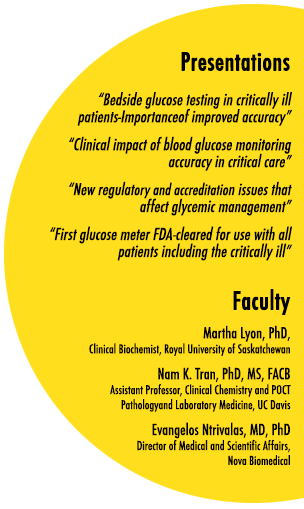Join us for a P.A.C.E and CERP accredited educational seminar:
Clinical Impact of Blood Glucose Meter Accuracy in Critically Ill Patients
A clinician’s treatment of critically ill patients can be undermined by inaccurate point-of-care (POC) glucose meter results. Inaccurate results can be caused by patient physiology or exogenous interfering substances, like medications, therapeutics and non-glucose sugars. Interferences put patients at risk for improper insulin dosing and missed hypoglycemic events based on inaccurate glucose results, which have caused adverse events and even death.
This seminar examines the role and importance of glucose meter accuracy in patient safety and outcomes. Using peer-reviewed evaluations and case studies, this seminar highlights the risks associated with interferences and sample selection for all hospitalized patients and especially for critically ill patients.
Continuing Education
This seminar provides 2.5 contact hours for P.A.C.E. continuing education credits, and has been approved by the Florida Board of Nursing. P.A.C.E. is a registered trademark of the American Society for Clinical Laboratory Science.
This Program Has Been Approved by the American Association of Critical-Care Nurses (AACN) for 2.50 CERPs, Synergy CERPs Category A, File Number 00019870.
Learning Objectives
Understand the clinical impact of POC BGMS accuracy
in critical care
Apply case studies of patient adverse events caused
by POC glucose meter interferences
Discuss new FDA and CMS regulatory requirements
for using BGMS with critically ill patients
Discuss only BGMS to be FDA-cleared for use with all
hospitalized patients including critically ill
Who Should Attend?
• Nurses
• Point-of-care coordinators
• Laboratory professionals • Risk managers
Space is limited.
We look forward to seeing you there!
